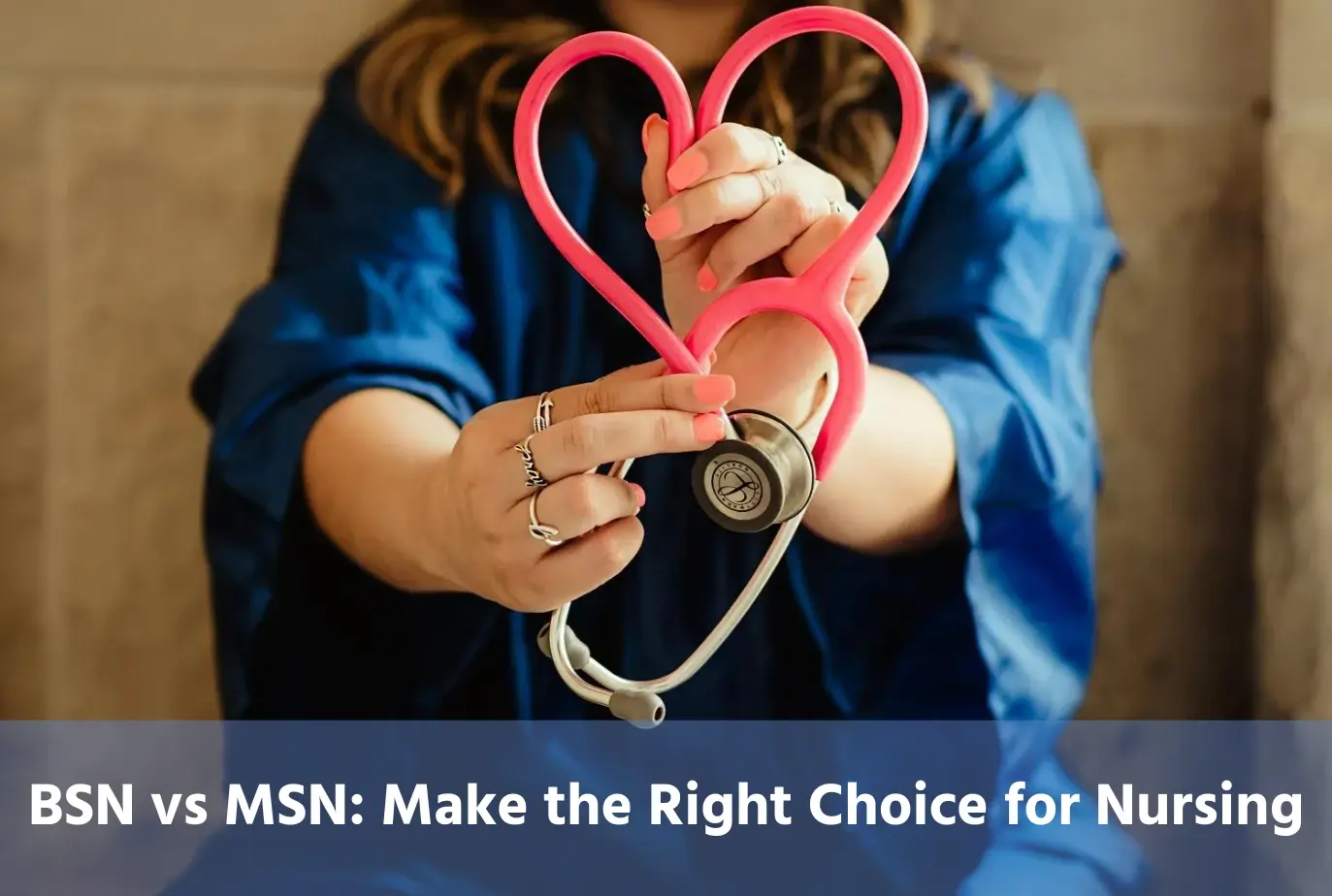If you wish to be successful in the healthcare industry, then it means you have to fully commit to constantly learning and improving your skill set. In the nursing career, there are plenty of stepping stones and the goal is to determine which steps are ideal choices for you in this line of work.
For this reason, nurses are always looking for ways to make advancements in their careers and they are constantly on the lookout for degrees that would get them their desired jobs.
Nurses mainly have to choose between two degrees- Master of Science in Nursing (MSN) or Bachelor of Science in Nursing (BSN). This decision can be personal and it completely depends on the individual circumstances of the nurses. Therefore, before making this crucial decision, nurses have taken a lot of factors into account.
Nursing is an entry-level degree program, with an MS degree offering advanced education and career advancement. However, many new nursing graduates find it challenging to decide between an MSN degree and a BSN degree. Both degrees will help you advance your nursing career.
Each degree has its own unique benefits and career prospects. In this blog, we’ll talk about the topic “BSN vs MSN” where will show the comparison between an MSN degree with a BSN degree to help you decide which one is ideal for you.
What is a BSN?
A BSN is an undergraduate degree specific to nursing professionals. The program takes three to four years to complete and includes coursework in nursing, biology, and other health-related courses.
Graduates of a BSN program have the educational credential to pursue licensure as registered nurses. The degree program requires coursework in nursing, anatomy and physiology, healthcare administration, and other topics specific to nursing practice.
A BSN program provides an education tailored to the needs of registered nurse practitioners (RNs). It generally covers advanced practice nursing roles such as nurse practitioner (NP) or nurse specialist (NS).
Earning a BSN degree prepares students to take the NCLEX-RN exam and become certified registered nurses. This exam is required for entry into nursing programs, as well as for certification as an RN or nurse practitioner.
Graduates of an undergraduate degree program in nursing are more likely to find employment as registered nurses. However, they can also pursue an advanced degree in nursing or another field of study after their bachelor’s degree is completed.
Thus, a BSN program serves as an excellent foundation for those who want to become registered nurse practitioners or nurse specialists.
What is an MSN?
An MSN is a graduate degree for nursing students who want to become registered nurses. With an MSN, a nurse practitioner, nurse anesthetist, nurse midwife, or nurse can apply for an advanced practitioner registered nurse (APRN) license.
Typically, nurse practitioners earn a median salary of $110,000 per year and nurse anesthetists earn a salary of $80,000 per year while nurse midwives have a yearly salary of $105,000. Registered nurses with a degree in MSN can earn a salary of $65,000 to $196,000.
It’s important to note that nursing with an MS degree opens the door to career options and salary potentials that are not available to nursing school graduates without an advanced degree. Plus, an MS in nursing can provide the education and experience necessary to pursue advanced practice registered nursing degrees such as nurse practitioner or nurse anesthetist.
Nurses with this particular degree have the knowledge and skills necessary to care for patients of all ages through acute care nursing and advanced practice nursing roles.
BSN vs MSN
By graduating with a Bachelor of Science in Nursing (BSN) degree, you will acquire advanced nursing knowledge and skills.
Whereas with an MSN degree, you’ll have an education that’s focused on enhancing nursing knowledge, developing critical thinking and problem-solving skills, and improving clinical practice.
Earning a BSN or MSN degree can lead to higher salaries and career advancement opportunities.
The most important differences between a BSN and an MSN are educational requirements and job opportunities.
A BSN degree is generally required for registered nurse (RN) positions, while an MSN degree is more commonly received by nurse practitioner (NP), nurse educator, or nurse practice administrator (NPA) positions.
It is also important to note that BSNs complete an undergraduate program of study focused on nursing care, while MSNs have an advanced education that includes nursing science or nursing practice as part of their program of study.
Similarities Between a BSN and an MSN

Both BSN and MSN degrees provide students with the skills needed to provide quality patient care. The degree programs have an education based on science, nursing practice, and health care policy.
BSN and MSN also have a clinical focus that exposes students to the practice of nursing. – Students of either program have opportunities to tailor the curriculum to their interests.
These degrees offer coursework on assessment and leadership. With both degree programs, students are prepared for entry-level nursing jobs or nursing career advancement.
However, it should be noted that an MSN program is more advanced than a BSN program in terms of education and clinical experience. That is exactly why an MSN program provides graduates with an even deeper understanding of nursing practice and advanced practice nursing roles.
Additionally, an MSN program may be more cost-effective in terms of salary increase than a BSN program due to its advanced education content.
For all these reasons stated above, it is very crucial for nurses to consider the type of degree program that best fits their educational goals and career aspirations.
Differences between a BSN and MSN
The main differences between a BSN and an MSN degree program include the concentrations they offer and the career paths of each of the programs.
BSNs provide nurses with more career options and potentially higher salaries. However, an MSN program equips nurses with the knowledge to serve as primary care providers, giving them an in-depth understanding of healthcare practice.
Furthermore, a bachelor’s degree in nursing (BSN) is required for entry into an MSN program. In addition to coursework, an aspiring nurse should also have experience working in nursing care settings, such as hospitals or nursing homes.
Additionally, BSNs teach nurses how to provide quality patient care, but do not train nurses to be primary care providers. Whereas, an MSN program provides students with advanced clinical training, teaching them about patient care and healthcare fundamentals such as clinical practice, anatomy, physiology, health assessment, health promotion and disease prevention.
Last but not least, the requirements for a BSN degree include a high school diploma or GED, a minimum GPA of 3.0, SAT or ACT scores, TEAS scores, letters of recommendation, as well as work experience.
Admission Requirements
To be eligible for a bachelor’s degree in nursing program, candidates need to have a high school diploma or equivalent, such as a GED.
To apply for an advanced nursing degree program like an MSN or DNP program, candidates have to possess either a BSN or bachelor’s degree in a non-nursing field and an RN license. Some advanced nursing degree programs may accept candidates with an RN license obtained through a diploma program.
Additionally, before applying to an advanced nursing degree program, candidates need to meet the minimum requirements of an RN license and an undergraduate degree in nursing. These requirements include an RN license and a BSN, as well as clinical experience and a minimum GPA and GRE test scores.
Career Advancement
A bachelor’s degree in nursing (B.N.) is the minimum education required for professional nursing practice. On the other hand, a master’s degree in nursing (M.N.) is an advanced nursing degree that requires more than a bachelor’s degree and allows registered nurses more opportunities to work as educators and nurse managers.

An advanced practice registered nurse (APRN) certification requires an advanced nursing degree such as an M.N. Additionally, hospitals are increasingly favoring nurses with an advanced nursing degree, as this level of education can lead to higher pay and better job opportunities.
A master’s degree in nursing offers advanced education for nurse leaders, who can perform additional roles such as nurse educator or nurse manager. The skills gained from an advanced nursing degree are highly valued in healthcare settings and can help improve patient care outcomes and patient safety.
Conclusion
To make an informed decision, it is imperative to understand what each degree program offers. However, it is also vital to determine if your goals align with the program’s requirements.
Whether you are interested in pursuing a master’s degree in nursing or another advanced degree, be sure to research all of your options and choose one that best fits your career goals and aspirations.
The choice between BSN vs MSN should be based on personal aspirations and career goals, taking into account the current demands and trends in the nursing industry.
FAQs
How long does it usually take for someone to become a Nurse Practitioner (NP)?
A student who has a high school diploma with no prior college credits can become a nurse practitioner in about six to eight years.
How long does it usually take for someone to complete an MSN-to-DNP program?
Depending on the program structure, the number of practicum hours needed, and the specialization area, Registered Nurses (RNs) enrolling full-time in this program can earn a DNP degree in about two years or less.
In Nursing Administration, what can you possibly do with an MSN?
MSN in these programs prepare registered nurses to make advancements into high positions, such as management and leadership, in the field of nursing.

Leave a Reply